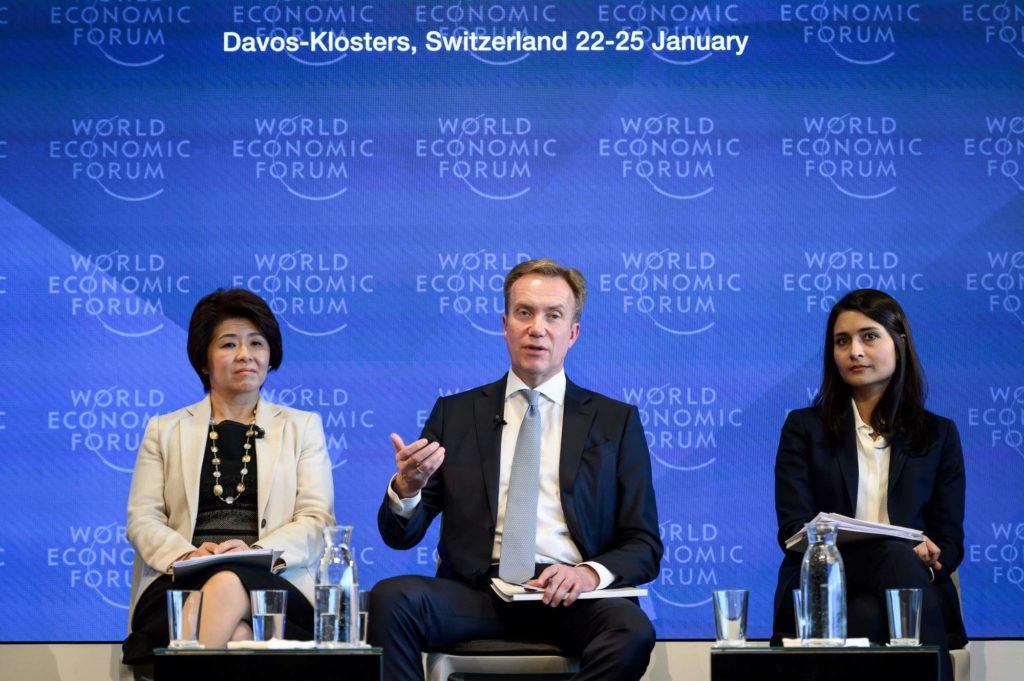The Next Global Recession Will Have No Brakes, Claims World Economic Forum

The Swiss non-profit observed that the looming recession – or "slowdown" – is unlikely to be "as severe as the Great Recession of 2008–2009." | Credit: Fabrice Coffrini/AFP
The global economy is careering headfirst into an economic crisis, and unlike the 2008 recession, there’s not much of a safety net.
That is according to the World Economic Forum (WEF), which published its annual Global Competitiveness Report . The Swiss non-profit observed that the looming recession – or “slowdown”– is unlikely to be “as severe as the Great Recession of 2008–2009.” While this serves as somewhat comforting news, the report went on to note that “policymakers generally have fewer policy options today than they did back then.”
No Stopping the Next Recession
The anticipation of a global recession has reached a fever pitch in 2019. The U.S. Federal Reserve’s rate-cutting frenzy and the European Central Bank’s (ECB) flagrant use of quantitive easing already attest to an economic slowdown. While economies around the world attempt to delay the inevitable, catalysts of an impending crisis continue to form.
One primary concern highlighted in the report is that despite global attempts to expand, some economies are facing a liquidity trap. Indeed, within the eurozone, monetary policy is having little impact on stimulating growth.
Since 2014, Europe has quelled its economy by implementing negative interest rates, but analysts suggest that it has fallen into the dreaded trap. The European Commission has advised towards a preemptive fiscal policy as opposed to the reactive stance currently taken.
Trade War Takes Its Toll
It isn’t only failing monetary policy threatening to harden the blow of a recession; in its report, the WEF cites macro risks as well:
“The geopolitical context is more challenging than in 2007, with gridlock in the international governance system and escalating trade and geopolitical tensions fuelling uncertainty.”
Undoubtedly the report is mainly alluding to the escalating trade war between China and the US. The ongoing tension between the two superpowers has had a direct and volatile impact on global stocks. Yesterday, the Dow Jones fell 300 points as hopes of trade talks between the U.S. and China dissipated.
The managing director of the International Monetary Fund (IMF), Kristalina Georgieva, cited rising geopolitical tensions as probable cause for the “synchronized slowdown” of the global economy. Georgieva revealed during a speech Tuesday that the fund will reduce its global growth forecast for 2019 and 2020 to its lowest rate since 2010.
“Two years ago the global economy was in a synchronised upswing. It is now in a synchronised slowdown. This widespread deceleration means that growth this year will fall to its lowest rate since the beginning of the decade”
Could the Next Recession Be Worse Than the Last?
While the WEF report writes that the next recession won’t as severe as the Great Recession of 2008, rising debt obligations could prove this hypothesis wrong. At present, global debt is somewhere in the ballpark of $246.5 trillion and rising.

Sovereign debt within the U.S. currently represents around 9% of the total global figure, sitting at a lofty $22 trillion and more than doubling in the past decade. This may prove to be the trigger to make the great recession even greater.
Eventually, these debts will need to be repaid. Unfortunately, that time will likely come when interest rates are no longer maintained and borrowers are forced to default with spending cut as a result.
Gold bug and economic doomsayer Peter Schiff is a propagator of this theory. In an interview with Fox Business, Schiff highlighted that not even quantitative easing would save the economy this time around, adding that an inflationary recession would follow:
“The next crisis is not subprime mortgages, it’s gonna be in the Treasury market, its gonna be sovereign debt, and a currency crisis.”